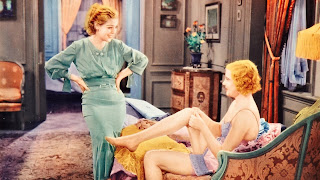
John Shadwell (John Boles) and Vergie Winters (Ann Harding) were planning to marry, but Vergie's father (Edward Van Sloan) told John that Vergie is instead marrying Hugo McQueen (Creighton Chaney). In pain, John marries Laura Shadwell (Helen Vinson) on the rebound. But Jim Winters had been paid $10,000 to tell the lie, and trick John into the marriage with Laura. Unable to divorce his wife, John visits Vergie on a regular basis, while his political star begins to rise. Our film this week is The Life of Vergie Winters (1934).
Based on Louis Bromfield's short story (AFI catalog), this film is similar to the stories that are told in Forbidden (1932) and Back Street (1932) - a couple whose true love is thwarted by circumstance, but stay together despite the rules of society. And while this is not an original plot, Ann Harding makes Vergie so likable that you don't really care that you know the story. You keep watching just to see her.
There are class issues regarding Vergie's potential marriage to John which assist the Shadwells' lies; and Laura is eager to marry a man with political possibilities. Vergie, however, is seemingly well regarded (initially) by the community. A milliner with a popular store, her wealthy clientele are friendly with her (albeit only during business hours). When her secret life becomes more public, she loses her society shoppers, but inherits a new customer base, represented by Pearl Turner (Cecil Cunningham), a local madam. Rich or poor, Vergie displays an easy relationship with her customers.
The film also has an interesting "innovation" not a part of the previously mentioned movies. The Life of Vergie Winters uses narratage (New York Times review); the inner monologues of the townpeople at the opening of the film (the film actually begins with John's death and Vergie's imprisonment) serve as a kind of Greek chorus, preparing the audience for the story that is about to unfold. The technique was very reminiscent of the inner monologue in Strange Interlude (1932) and is interesting, if a bit stylized.
Helen Vinson, on the other hand, plays Laura as a opportunistic witch. She has no regard for John; she wants the prestige that his political possibilities will provide and nothing more. It's pretty apparent that the marriage is eventually one of convenience; it's also clear that she has no use for the child that she has taken into her home (the end of the film - without giving much away - substantiates that). Ms. Vinson's career was primarily playing the "other woman." She started on Broadway, appearing in four plays between 1927 and 1932, then went to Hollywood, where she would make 40 films, including Jewel Robbery (1932), I Am a Fugitive from a Chain Gang (1932), and In Name Only (1939). Her final film was The Thin Man Goes Home (1945). Married for the third time to Donald Hardenbrook the following year, she left film at her husband's request. They were married until his death in 1976; Ms. Vinson died in 1999 at the age of 92.
One of the most appealing people in the film is that of Joan. We first see her as a girl of about 11 (played by Bonita Granville). She's an engaging child, kind to Vergie (who she has been told to avoid). The interaction between Ms. Harding and Ms. Granville is touching. The character does not alter as she ages - Betty Furness is lovely as a woman who has somehow stayed a good and loving person, despite being raised by a viper.
There are a few other actors who should be mentioned - Lon Chaney, Jr. (still listed as Creighton Chaney - his true given name) has a few scenes as Hugo McQueen, the man Vergie's father says she is marrying. Donald Crisp is the villain of the piece as Mike Davey, a local pub owner who despises John. Sara Haden is Winnie Belle, the woman who has set her cap on Vergie's despicable father. Ben Alexander, who would later gain fame as the first of Jack Webb's partners in Dragnet, appears as Laura's brother Barry. And Walter Brennan has a brief scene as a rumor-spreading drunk.
The New York Times review by Mordaunt Hall was indifferent; the film was "important" enough that it opened at Radio City Music Hall. It probably will come as no surprise that the film landed on the Catholic Church's Condemned List, which also helped it to do well at the box office (TCM article). But, with a release date of June 14, 1934, it's at the end of the pre-code era - the new regulations took effect on July 1st, and would effectively have made this film impossible to release in its current state. So, while it is not the most original of plots, it is handled well, and it's always a pleasure to see Ann Harding at her peak. We enjoyed it, and think you will as well.

















